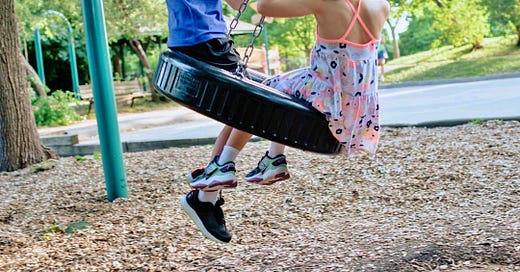Originally published in the Moultrie News.
I read an essay by an American mom living in France about differences in how parents raise their kids in each country. Would it help us to adopt some of the French ways?
The essay appeared in Business Insider and was written by Erica Jackson Curran, a Virginian currently raising her 7-year-old son in Bordeaux, France. Curran explains five significant differences in parenting styles between the two countries.
The first is that American parents hover over their children a lot more. Curran says when her son was younger, she, like many American parents, stuck close to him on the playground, “reminding him to be careful, standing ready to catch him if he fell and even intervening if he encountered a poorly behaved kid.” This is rare in France, where parents often let their kids enjoy independent play.
American parents might think such laissez-faire would result in a stream of childhood deaths and disfigurements, but Curran says it’s the opposite: “I rarely hear crying children at French playgrounds or witness so much as a skinned knee.”
I haven’t yet met anyone who thinks helicoptering is advantageous for children, yet American parents continue to practice it. Kids need space to work their way through obstacles, but American parents largely forbid it. This has been identified as a reason for the rise of youth anxiety.
Curran’s second observation is that French parents ensure kids are “impeccably dressed,” even at the park. Boys are attired in button-up shirts while girls wear dresses and bows. In contrast, Curran puts her child in joggers, t-shirts, and hoodies.
I don’t see dress-down attire as a problem on the playground, but school is a different story. American children often wear the same sloppy athleticwear for learning as playing. As a result, kids “put on” an attitude of play in an environment that demands focus, efficiency, and discipline. It’s no coincidence that student attention has dropped as dress has gotten more casual.
Curran’s third difference is that American parents yell at their kids more than French parents. “When a French kid does something naughty,” she observes, “they’re pulled aside and very quietly and sternly reprimanded.” She believes this is partly why French kids are better behaved.
Curran says American yelling is so common that “reprimands are often completely ignored by their kids.” This may be because yelling is supposed to be a warning, not a punishment. American parents, however, are consequence-averse, so yelling is usually followed with nothing. This leads to more yelling, which kids shrug off.
Quiet reprimands are no more effective unless they are backed up with appropriate consequences. Regardless of how loud words are, actions are always louder. Once kids know a warning has significance, its volume makes little difference.
Curran’s fourth point is that French kids rarely have screens at places like restaurants. They “sit quietly and politely.” She notes her shock over a French child who “spoke quietly with his parents throughout the meal” while her own son played games on the phone.
I say “Vive la France” to this one. American parents are too eager to use tablets and phones to keep kids quiet. Yes, it’s easier than setting expectations and coaching children to meet them, but the long-term consequences are devastating.
Curran’s final observation is that American kids snack all day, frequently on junk food, while French kids snack only once, during le goûter around 4:30 p.m. When her son’s French friends come over, “they seem genuinely perplexed when he offers them snacks” and usually ask for milk or fruit instead.
Continuous snacking is woven into America’s parenting “comfort culture” in which parents fend off anything that might make their children feel unfulfilled, uncomfortable, or different. Unfortunately, the repercussions include unhealthiness, entitlement, and self-absorption.
Interestingly, Curran’s essay is not a bow to French parenting. She defends the American way, even while admitting the outcomes are inferior. But in the end, it isn’t about imitating the French or anyone else. It’s about becoming the best parents we can be. In that endeavor, we can learn from anyone’s mistakes and successes, even our own.
Jody Stallings has been an award-winning teacher in Charleston since 1992 and is director of the Charleston Teacher Alliance. To submit a question, order his books, or follow him on social media, please visit JodyStallings.com.





YES about the yelling! Playgrounds in the US are just full of parents yelling "be careful" over and over and over again
Insightful and encouraging!